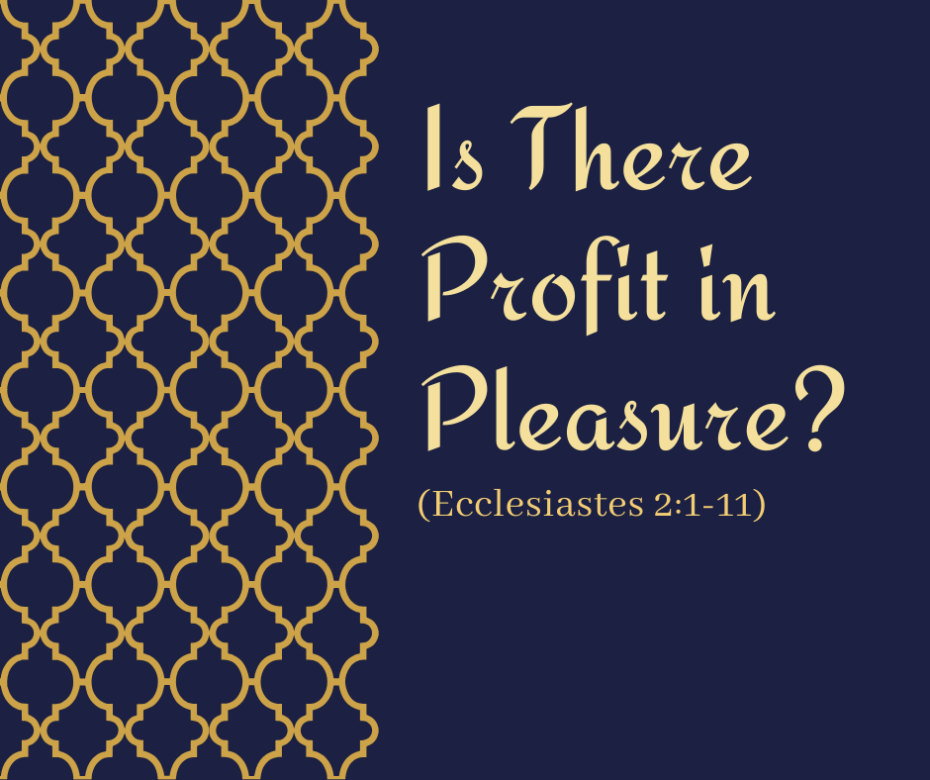What is the purpose of life? Why should anyone want to keep on living? Solomon was looking for meaning, for “profit”—
What profit has a man from all his labor
In which he toils under the sun? (Eccl 1:3).
Solomon started his search with wisdom, but found it only led to a great appreciation for the insignificance and futility of life—wisdom led to sadness, not meaning.
But he had just started the search. Where else could he find meaning in life? One option that everyone considers at one point or another is to experience pleasure. “If the mind cannot make me happy, then maybe the body can” (Kreeft, Three Philosophies of Life, p. 39). That experiment in finding meaning through bodily pleasure is something our culture has been pursuing for decades. How is it working out?
It didn’t work out for Solomon, and he had the money, power, and opportunity to indulge his every craving.
For example, have you ever thought to yourself that you could be happy if you just had your dream house—a mountain cabin, or beach house, or penthouse in a trendy part of town? So did Solomon. So he built his ideal estate:
I made my works great, I built myself houses, and planted myself vineyards. I made myself gardens and orchards, and I planted all kinds of fruit trees in them. I made myself water pools from which to water the growing trees of the grove (Eccl 2:4-6).
Have you ever thought you could be happy if you just had some people to help take care of the mundane tasks of life—people to cook and clean and tidy up? So did Solomon:
I acquired male and female servants, and had servants born in my house (Eccl 2:7a).
Have you ever wanted to be a cowboy, to live on a hobby farm, or to retire to the country with some animals? Solomon tried that, too:
Yes, I had greater possessions of herds and flocks than all who were in Jerusalem before me (Eccl 2:7b).
And of course, if only you were financially secure, then you’d be happy, wouldn’t you?
I also gathered for myself silver and gold and the special treasures of kings and of the provinces (Eccl 2:8a).
What if you could have whatever you wanted, whenever you wanted it?
Whatever my eyes desired I did not keep from them.
I did not withhold my heart from any pleasure (Eccl 2:10a).
If you had all that you wanted, wouldn’t that, by definition, be enough?
The answer is: it’s not enough! The more he had, the more he wanted, the less he was satisfied. It was a never ending struggle, like grasping for the wind:
Then I looked on all the works that my hands had done
And on the labor in which I had toiled;
And indeed all was vanity and grasping for the wind.
There was no profit under the sun (Eccl 2:11).
He did it all, experienced every pleasure, every comfort, every entertainment, and it never satisfied him. Pleasure is pleasure, but it is not meaning.
Is that what you’ve found, too? Is your car or truck enough? Your phone? Your computer? That favorite dish in the hole-in-the-wall restaurant? That degree?
And worse, after death, he would have to leave everything he had gained to someone else:
Then I hated all my labor in which I had toiled under the sun, because I must leave it to the man who will come after me. And who knows whether he will be wise or a fool? Yet he will rule over all my labor in which I toiled and in which I have shown myself wise under the sun. This also is vanity (Eccl 2:18-19).
Pleasure is pleasurable for a while, but only for a while. Eventually it gets boring. And that boredom may lead you to seek for greater pleasure, more intense, more thrilling, and often more taboo—but it’s never enough, and eventually you get used to that, too. Hedonism ends in dull decadence. With 700 wives and 300 concubines (1 Kgs 11:3), Solomon knew all about decadence, and it never made him happy.
Pleasure is not meaning.
Think of all the Hollywood idols who have died of overdoses, have had a string of meaningless relationships and multiple divorces, who have gone in and out of rehab, and have otherwise destroyed themselves with vice, in the search for meaning or pleasure. Did they find it? No more than did Solomon.
Thus, Solomon’s second attempt to find meaning “under the sun” also resulted in failure. If both wisdom and pleasure failed to give life meaning, what else is there? In the next blog, I’ll look at Solomon’s next experiment.


